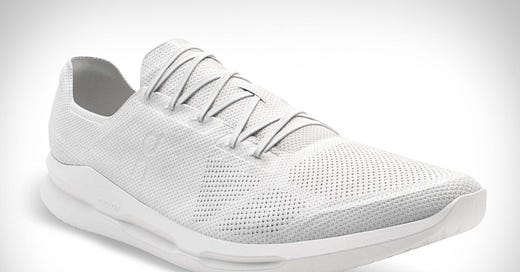The running shoe you will never own. How On is making sports fashion more sustainable
Swiss sportswear brand On announced a subscription-based trainer. On, whose subscription will cost £25/month, claim to have created a revolutionary, zero-waste product. Brilliant or BS? Let's see:
On – a track record of thinking differently
In 2010, high in the Swiss Alps, three friends had the radical idea that running shoes shouldn’t be a compromise; a cushioned shoe should not equal a slower run. Thus, On was born, their technology combining soft landings with explosive take offs to create the ultimate running shoe. Now On have offices all over the world – their shoes are sold in over 50 countries. Last year Roger Federer, the face of Switzerland, joined as a ‘co-entrepreneur’.
Sustainability has always been at the forefront of what On does. On average, the material manufacturing process accounts for 80% of a shoe’s hefty carbon footprint. Vegan leather, 100% recycled packaging and internal CO2 budgets for team travel are just some of the steps On has taken to limit its environmental impact. Now, with the newly-released, dye-free Cyclon running shoes made from castor beans (yes, beans), On has gone one step further.
rSaaS (running Shoes as a Subscription)?!
Yep, you better believe it. In a world of already too many acronyms I don’t think this one will catch on. The idea behind it, however, may have a better chance. Subscribers will initially get a pair of Cyclon running shoes. When worn out (estimated lifespan is 400km), simply return them and get a new pair.
The old pair? 100% of the material gets recycled and turned into a fresh pair of Cyclons.
For the target market the economics may make sense
At £300/year (~$390), the subscription service is aimed primarily at the Strava demigods, not mere mortals who clock a 5k every other week.
With Cloud, On’s cheapest running shoes, priced at £120 ($155), if you’re a serious runner who would normally buy several pairs of shoes a year, subscribing could save you $$$, whilst easing the strain on our planet’s resources.
If, however, you’re not covering north of 1000km a year, you’ll likely be losing out since you won’t warrant a replacement pair frequently enough.
Even for top runners, there are factors besides price to consider:
· Lack of choice: subscription currently only available for the Cyclon model
· Shipping: in attempt to lower their carbon footprint further, On will only ship when the ‘minimum demand in your region is met’, which could lead to significant waiting time for your new pair of treads
Another blow for brick-and-mortar
On shoes are sold in more than 6,500 retail partners worldwide. Getting running shoes delivered via subscription reduces the need for physical stores. If subscription footwear catches on, footfall will be seriously impacted, placing already-struggling retailers in a perilous position.
The fashion industry as a whole
Time will tell if the Cyclon subscription is successful. On are now taking pre-orders – launch is expected late 2021. But if it does prove to be popular, could we see the subscription model replicated throughout the fashion industry?
Without a doubt from a sustainability point of view this would be a welcome move. In the UK alone, 350,000 tonnes of usable clothing end up in landfill each year. Fast fashion is a major contributor.
In fact, it could be argued fast-fashion companies such as ASOS, Boohoo and Forever 21 already operate a subscription model in everything but name. Customers make frequent purchases of cheap, poor-quality garms, which are deemed dispensable after only a few uses due to the low prices. It is a subscription service without the product recycling.
An opportunity for high-end brands
At a low price point, subscription clothing is unlikely to be economically viable. It seems to me, however, that there is scope for high-quality brands to manoeuvre. I can envisage customers paying circa £100/month to receive seasonal wardrobe essentials hand-picked by a personal stylist. These clothes are then returned at the end of the season to be repurposed.
Maybe this is too far-fetched and doesn’t account for consumers’ individual taste and style, but there would certainly be incentives in this for brands. Higher rates of customer retention/lower churn and a more predictable cash flow are a couple of benefits that spring to mind, not to mention the PR boost that would follow an eco-friendly initiative.
So, certainly no BS from On. It remains to be seen if it’s brilliant.
In the meantime, anyone for a run?
Like what you see? Hit subscribe below:





Great article Leo!
What numbers, exactly, must one be aiming for to achieve demigod status?
Really interesting similarities between the "fast-fashion subscription" and that of the Cyclon.
I feel that people often want a slight change in style when they order a new pair of trainers. Is this possible with the Cyclon subscription?
How often are customers allowed to replace their shoes, worn-out is subjective?
Are the beans grown sustainably? Could this do more harm than good? Would it not be better to use ocean-bound plastic for example, as has been done by Nike or adidas?
Not sure it would lead to the direct demise of the high street, online retail probably doing more damage than subscription. This must be a marketing ploy, or is it...